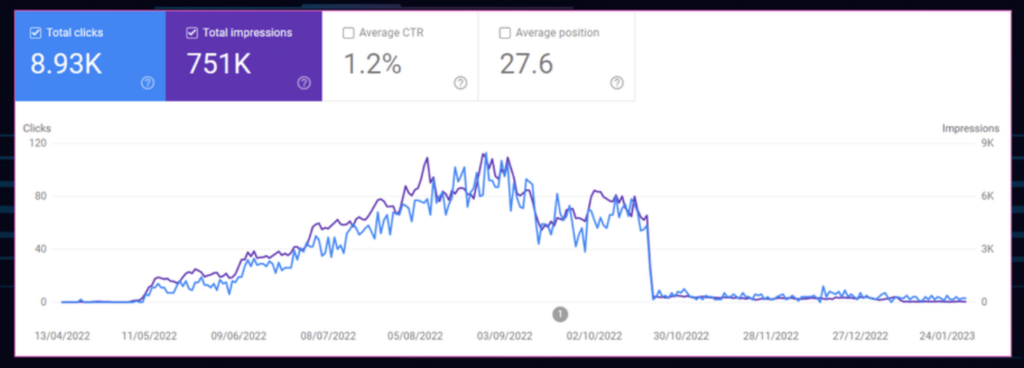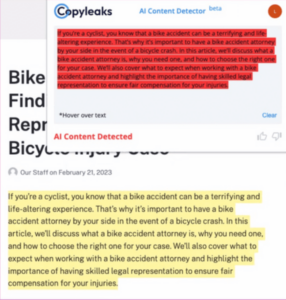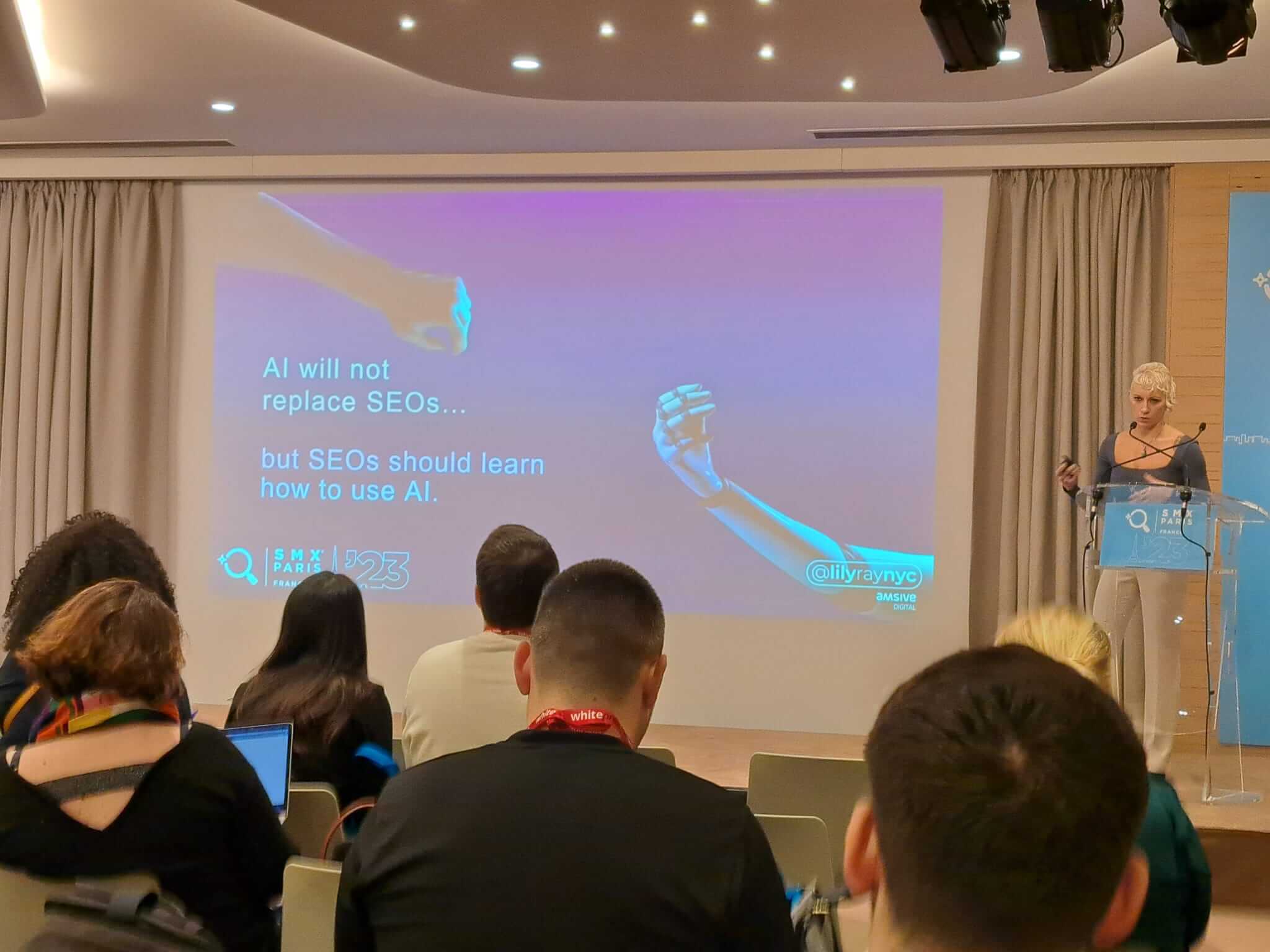Together with my colleague Mathilde, I had the opportunity to participate in the last SMX Advanced conference that recently took place in Paris. In this article, you will find the main takeaways from 2 very interesting presentations I joined. The first one is about the future of SEO and AI and the second one is about link building.
SEO & AI
In this presentation, Lily Ray shared her opinion about how AI tools will impact SEO and the way people search in the future.
She started her presentation by stating that AI will not replace SEO but SEOs should learn how to use AI. This is something we totally agree with at CLICKTRUST. We experienced it, AI Chatbots can help us save time with our day-to-day tasks and improve efficiency in our way of working. In one of our previous articles, you can learn actionable ways to use ChatGPT with your SEO daily tasks.
Search chatbots can certainly provide more efficiency, but we need to know where the limit is and not overuse them!
Can search engines detect AI content?
In her presentation, Lily Ray shared an experiment that was done to test if Google could detect AI content and see how it would react. To do so a website was created with a lot of content. These were mostly FAQs and ‘people also ask’ questions. The answers to these questions were written entirely by search chatbots.
Well, as you can see below the results are pretty self-explanatory, it worked pretty well until AI content was detected and the traffic broke down.

Source: SMX presentation from Lily Ray – AI experiment, Google traffic.
By now we know that tools that can detect AI have been created and are actually working. Copyleaks is one of them. If a tool can detect AI content, we can assume that search engines certainly can as well. That’s where we need to be careful and don’t use them in a wrong and abusive way.

Source: SMX presentation from Lily Ray.
Tips for using AI chatbots for content creation
Here are different points of attention when it comes to using results from AI chatbots and more specifically when it comes to content creation;
1) Quality & original: be careful with the quality produced by AI. Not only the content needs to be of high quality but it also needs to be original to avoid duplicate content issues being flagged by search engines.
Get inspired but don’t copy-paste content from chatbots, always review it to be sure it matches your quality standards and your expectations of what you would like to provide to your audience.
2) Misinformation & sources: whether it’s in an article or by experimenting yourself, I think by now we have all seen at least one example of ChatGPT providing misinformation to a request. On top of that, it’s not providing sources for its answers. Don’t assume that ChatGPT knows what it’s talking about. This is something we all need to be careful with when using the tool.
Never forget that your brand image and reputation are at risk when sharing information with your users! So you better be sure that your content has been proofread, that you can provide sources (please don’t mention AI as the author!) and that they have been verified! Especially if your website has a high authority in his sector.
3) Helpful content: qualitative content has really become an important ranking factor for Google. We saw different updates being released last year related to that. The helpful content update in August and the E-A-T getting an extra E for experience in December. Google is now giving an advantage to websites that can match users’ search queries by providing them with helpful, original and experienced content.
I think at this point we all came to the conclusion that AI chatbots will not replace our jobs as SEOs or search engines. What is sure is that it will definitely impact the way people search and this is something we need to be prepared for!
Efficient link-building strategy
In which cases a link-building strategy can be useful for you?
When a website is young and needs to build authority: getting external backlinks can help grow that authority by getting link juice from other websites.
When you’re looking to index new pages: Google browse the internet and discover pages by following links between pages. By adding more external links pointing to your web pages, you can help Google to find your pages more easily and so improve the indexing process.
When you’re losing positions on specific keywords: always analyse first the reason that can cause that drop in position. It might be linked to a technical issue with your site which is not something link-building can solve. But if this is not an option, backlinks, right chosen with the right anchor text can definitely help you to get back those lost positions.
When competition is high on your focus keywords: backlinks can help you reinforce your organic position on your important keywords and therefore impact positively your visibility on the SERPs.
The key is to use a diversified strategy!
When it comes to link-building strategy, Guillaume Pracht recommends diversifying the use and sources of the backlinks we use. Link-building is more than only sponsored articles.
Private blog network: you can create your own blog network to be able to produce content and links easily and in high quantity to support a targeted main website.
Press articles: getting press articles written in influential media can help a lot to boost your website authority. You can try to get brand content produced or, more easily, get a link from existing content. Both techniques will have an impact if backlinks are coming from well-known media supports.
Articles on smaller blogs: same techniques but with smaller and more accessible media. If the websites or the pages you are linking from have high authority, the results can be as positive for you. The authority of a website/page is more important than the level of organic traffic.
Important criteria for an efficient strategy
Quality and authority: from the website or the page that will link to your targeted website. Select your websites carefully by verifying important metrics such as the authority of a domain or the trust flow. Relevancy is just as important. Try to partner with websites that have content, or at least pages, related to your own business.
Meet the search intent: everything between the external website providing the backlink to your own website needs to be contextualised. Make sure that the anchor text used is coherent with the content it’s placed in, but also with the content on your destination page. Does it match your on-page content? Does it match your meta data? Google needs to be able to rapidly understand the context of the link you are creating.
Avoid keyword stuffing: we saw above that a link-building strategy needs to be contextualised and stay within the same semantic field. However, you also need to be careful to not overuse that principle by doing keyword stuffing. It’s not something Google like and it can definitely arm your ranking.
Do-follow links: links are always “follow” by default, meaning that the link juice can be passed on from one page to another or from one website to another. But be careful when doing partnerships with some websites. Some could add a “no follow” tag inside the link meaning no link juice or authority and your deal will have no added value for you.
Lastly, never forget to prepare a plan of action and a follow-up process when your start to do lin-building.
Link-building is not only about buying a few links here and there. It should always be part of an SEO strategy. It needs preparation, analysis and planning. Once you started getting your first backlinks, analyse the results by following up on your keyword position and your visibility in the SERPs. Based on that, assess whether you need to keep going or can stop your efforts and maybe allocate your focus and your budget to other keywords and pages.
Ontvang onze inzichten rechtstreeks in je inbox
We duiken regelmatig in actuele onderwerpen op het gebied van digitale marketing en delen onze inzichten graag met jou.
